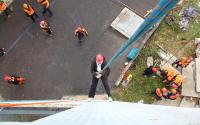23 February 2009
Bibi Netanyahu's assumption of power in Israel sets the stage for a huge campaign by the Israeli government, and its well-oiled lobby groups in Washington, to push us into a war with Iran.
Iran does not have a nuclear weapons program, according to U.S. and European intelligence agencies. But reality rarely impedes on politics. Secretary of State Hillary Clinton and President Barack Obama, along with Netanyahu, all talk as if Iran is on the brink of dropping the big one on the Jewish state.
Netanyahu on Friday named Iran as Israel's main threat after he was called to form a new government following the Feb. 20 elections.
"Iran is seeking to obtain a nuclear weapon and constitutes the gravest threat to our existence since the war of independence," Netanyahu said at a ceremony at President Shimon Peres' official residence. "The terrorist forces of Iran threaten us from the north," the presumptive prime minister said in reference to Lebanon and Syria, where Israel says Tehran supplies arms to Hezbollah and Hamas. "For decades, Israel has not faced such formidable challenges."
Netanyahu, whose arrogance is as outsized as his bellicosity, knows that for all his threats and chest thumping, Israel is incapable of attacking Iranian targets alone. Israel cannot fly its attack aircraft over Iraqi air space into Iran without U.S. permission, something George W. Bush refused to grant, fearing massive retaliatory strikes by Iran on American bases in Iraq. Israel's air force is not big enough to neutralize the multiple targets, from radar stations to missile batteries to Revolutionary Guard units to bunkers housing Iran's Soviet- and Chinese-made fighter jets and bombers, and also hit suspected nuclear targets. The only route to a war with Tehran for the Israeli military is through Washington.
Netanyahu's resolve to strike Iran means that we will soon hear a lot about the danger posed by Iran—full-page ads in American newspapers from Israel lobby groups have appeared in the past few days. Allowing this rhetoric to cloud reality, as we did during the buildup to the war with Iraq, would shut down the best chance for stability in the Middle East—a negotiated settlement with Iran. This may not finally stop Iran from developing a nuclear weapon, but a stable relationship with Iran would do more to protect Israel and our interests in the Middle East than massive airstrikes and a war that would bleed into Iraq and Lebanon and see Iranian missiles launched against Israeli cities.
"If you go into a problem with a mistaken assumption, you come out with a bad policy," said Sam Gardner, a retired colonel of the U.S. Air Force who has taught strategy and military operations at the National War College, Air War College and Naval War College, and who opposes the Israeli campaign to strike Iran.
Iran's nuclear program is currently monitored by inspectors of the International Atomic Energy Agency. Iran had amassed about 2,227 pounds of low-enriched, or reactor-grade, nuclear fuel by late January, according to the latest updates from the arms control watchdog for the United Nations. To produce the 55 pounds of highly enriched, or weapons-grade, uranium needed for an atomic warhead, Iran would need 2,205 to 3,748 pounds of low-enriched uranium. It apparently has this amount—which is why Netanyahu refers to Iran as "an existential threat" to the Israeli state. But Iran has made no move to enrich the uranium and until it does cannot be accused of having a nuclear weapons program. Iran also does not have enough high-speed centrifuges at its facility in Natanz to further refine the uranium, according to the United Nations.
Iran has turned to its old nemesis Russia for assistance as Israel has become more strident. The work on the Bushehr nuclear reactor will soon be assisted by 3,000 Russian technicians. And Russia has promised to sell the S-300 missile to Iran to boost that nation's air defense systems. The Russian Federation Security Council and the State Council's new national security strategy statement says that the primary focus of the struggle over the next decade will be on hydrocarbons. The Middle East and Central Asia are mentioned specifically. In these areas, according to the document, the struggle could develop into a military confrontation. And, while the document does not mention the United States, there is no other rival military force in the region that can match the Russian machine. The more we push Iran the more Iran flees into the arms of the Russians and the closer we come to a new Cold War struggle for control of diminishing natural resources. Iranian officials have barred inspections of facilities producing centrifuge parts, a move which worries arms control specialists. Iran may be planning to build an undeclared centrifuge facility separate from Natanz. Iran has also barred inspectors from its heavy-water reactor near Arak, an action that has concerned inspectors who hope to examine the site for possible telltale "clandestine" features that could be used in a weapons program. These signs would indicate that Iran could begin a nuclear weapons program. But as of now there is no such program. We should stop speaking as if one exists.
The destruction of Iraq as a unified state has left Iran the power broker in the Middle East. This was the result of our handiwork and the misguided militarism of Israeli politicians such as Netanyahu. Iran, like it or not, holds the power to decide the outcome of several conflicts that are vital to American security. It has enormous influence with Hamas and Hezbollah and can accelerate or diminish the conflict between Israel and these groups. It and the U.S. are now the major outside forces in Iraq. The Shiite-led Baghdad government consults closely with Iran and for this reason has told the Iranian resistance group the MEK that it has 60 days to leave Iraqi territory and may see its leaders arrested and tried for war crimes. Once American forces leave Iraq, it is Iran, more than any other nation, that will determine the future of any Iraqi government. And, finally, Iran has for centuries been embroiled in the affairs of Afghanistan. It alone has the influence to stabilize the conflict, one that increasingly threatens to spill over into Pakistan. Afghan politicians have sharply criticized the Iranian government for deporting more than 30,000 Afghans who had fled to Iran since October. Many, unable to find work or return to their villages, have signed up to fight for the Taliban, according to U.S. intelligence reports.
Iran has endured our covert support for armed militant groups from the Mujahedin-e Khalq Organization (MEK or MKO) to the Free Life Party of Kurdistan to the repugnant Jundullah, also known as the Army of God, a Sunni fundamentalist group that operates with U.S. support out of Pakistan. Jundullah has carried out a series of bombings and ambushes inside Iran. The militant group has a habit of beheading Iranians it captures, including a recent group of 16 Iranian police officials, and filming and distributing the executions. Iran has coped with nearly three decades of sanctions imposed by Washington. The U.S. support for the militant groups and the sanctions, meant to help change the regime in Tehran, have failed.
There is a lot riding on whom President Obama names as his special envoy to Iran. If, as expected, it is Dennis Ross, a former official of AIPAC, the American Israel Public Affairs Committee, we will be in deep trouble. Ross, who is expected to be placed in charge of the Iranian portfolio this week, is a vocal supporter of Israel's call for increased pressure on Iran. He is distrusted, even despised, in the Muslim world and especially in Tehran. With good reason, he is not viewed as an impartial broker.
Ross has called for more draconian sanctions against Iran, something Russia or the five companies that provide Iran's refined petroleum products are not likely to support. (The companies include the Swiss firm Vitol, the French giant Total and the Indian firm Reliance.) Ross backs the covert support for proxy groups and, I would assume, the alleged clandestine campaign by Israel's intelligence agency, Mossad, to assassinate Iranian nuclear scientists. Mossad is rumored to be behind the death of Ardeshire Hassanpour, a top nuclear scientist at Iran's Isfahan uranium plant, who died in mysterious circumstances from reported "gas poisoning" in 2007, according to the British newspaper The Daily Telegraph. "Other recent deaths of important figures in the procurement and enrichment process in Iran and Europe have been the result of Israeli 'hits,' intended to deprive Tehran of key technical skills at the head of the program, according to the analysts," the paper reported.
It remains unmentioned that Israel, which refused to sign the Nuclear Non-Proliferation Treaty—signed by Iran—is in possession of 200 to 300 nuclear warheads, perhaps the single most important factor in the Middle East nuclear arms race.
"For the US to shape a peaceful relationship with Iran will be difficult under any circumstances," Stephen Kinzer, author of "All the Shah's Men," wrote recently. "If the American negotiating team is led by Ross or another conventional thinker tied to dogmas of the past, it will be impossible."
Obama has an opportunity to radically alter the course we have charted in the Middle East. The key will be his administration's relationship with Iran. If he gives in to the Israel lobby, if he empowers Ross, if he defines Iran as the enemy before he begins to attempt a negotiated peace, he could ignite a fuse that will see our wars in Iraq and Afghanistan evolve into a regional conflagration. This may be the most important decision of his presidency. Let's pray he does not blow it.






